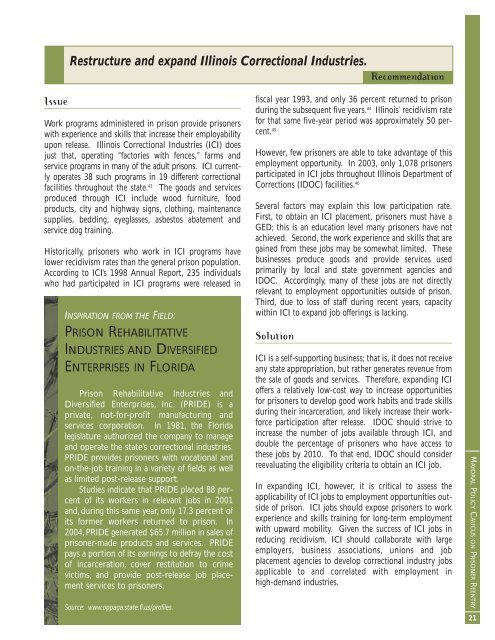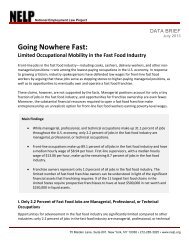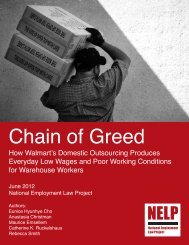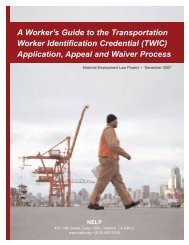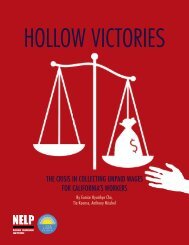Rebuilding Lives. Strengthening Communities.
Rebuilding Lives. Strengthening Communities.
Rebuilding Lives. Strengthening Communities.
Create successful ePaper yourself
Turn your PDF publications into a flip-book with our unique Google optimized e-Paper software.
Restructure and expand Illinois Correctional Industries.<br />
Recommendation<br />
Issue<br />
Work programs administered in prison provide prisoners<br />
with experience and skills that increase their employability<br />
upon release. Illinois Correctional Industries (ICI) does<br />
just that, operating “factories with fences,” farms and<br />
service programs in many of the adult prisons. ICI currently<br />
operates 38 such programs in 19 different correctional<br />
facilities throughout the state. 43 The goods and services<br />
produced through ICI include wood furniture, food<br />
products, city and highway signs, clothing, maintenance<br />
supplies, bedding, eyeglasses, asbestos abatement and<br />
service dog training.<br />
Historically, prisoners who work in ICI programs have<br />
lower recidivism rates than the general prison population.<br />
According to ICI’s 1998 Annual Report, 235 individuals<br />
who had participated in ICI programs were released in<br />
INSPIRATION FROM THE FIELD:<br />
PRISON REHABILITATIVE<br />
INDUSTRIES AND DIVERSIFIED<br />
ENTERPRISES IN FLORIDA<br />
Prison Rehabilitative Industries and<br />
Diversified Enterprises, Inc. (PRIDE) is a<br />
private, not-for-profit manufacturing and<br />
services corporation. In 1981, the Florida<br />
legislature authorized the company to manage<br />
and operate the state’s correctional industries.<br />
PRIDE provides prisoners with vocational and<br />
on-the-job training in a variety of fields as well<br />
as limited post-release support.<br />
Studies indicate that PRIDE placed 88 percent<br />
of its workers in relevant jobs in 2001<br />
and, during this same year, only 17.3 percent of<br />
its former workers returned to prison. In<br />
2004, PRIDE generated $65.7 million in sales of<br />
prisoner-made products and services. PRIDE<br />
pays a portion of its earnings to defray the cost<br />
of incarceration, cover restitution to crime<br />
victims, and provide post-release job placement<br />
services to prisoners.<br />
Source: www.oppaga.state.fl.us/profiles.<br />
fiscal year 1993, and only 36 percent returned to prison<br />
during the subsequent five years. 44 Illinois’ recidivism rate<br />
for that same five-year period was approximately 50 percent.<br />
45<br />
However, few prisoners are able to take advantage of this<br />
employment opportunity. In 2003, only 1,078 prisoners<br />
participated in ICI jobs throughout Illinois Department of<br />
Corrections (IDOC) facilities. 46<br />
Several factors may explain this low participation rate.<br />
First, to obtain an ICI placement, prisoners must have a<br />
GED; this is an education level many prisoners have not<br />
achieved. Second, the work experience and skills that are<br />
gained from these jobs may be somewhat limited. These<br />
businesses produce goods and provide services used<br />
primarily by local and state government agencies and<br />
IDOC. Accordingly, many of these jobs are not directly<br />
relevant to employment opportunities outside of prison.<br />
Third, due to loss of staff during recent years, capacity<br />
within ICI to expand job offerings is lacking.<br />
Solution<br />
ICI is a self-supporting business; that is, it does not receive<br />
any state appropriation, but rather generates revenue from<br />
the sale of goods and services. Therefore, expanding ICI<br />
offers a relatively low-cost way to increase opportunities<br />
for prisoners to develop good work habits and trade skills<br />
during their incarceration, and likely increase their workforce<br />
participation after release. IDOC should strive to<br />
increase the number of jobs available through ICI, and<br />
double the percentage of prisoners who have access to<br />
these jobs by 2010. To that end, IDOC should consider<br />
reevaluating the eligibility criteria to obtain an ICI job.<br />
In expanding ICI, however, it is critical to assess the<br />
applicability of ICI jobs to employment opportunities outside<br />
of prison. ICI jobs should expose prisoners to work<br />
experience and skills training for long-term employment<br />
with upward mobility. Given the success of ICI jobs in<br />
reducing recidivism, ICI should collaborate with large<br />
employers, business associations, unions and job<br />
placement agencies to develop correctional industry jobs<br />
applicable to and correlated with employment in<br />
high-demand industries.<br />
MAYORAL POLICY CAUCUS ON PRISONER REENTRY<br />
21


